Understanding the Critical Intersection of ADHD and Alcohol
ADHD, a common neurodevelopmental disorder characterized by inattention, impulsivity, and hyperactivity, often persists into adulthood. Research increasingly highlights a strong association between ADHD and substance use, particularly alcohol. This article explores how ADHD influences alcohol consumption, the risks involved, and strategies for managing this complex relationship.
The Connection Between ADHD and Alcohol Use
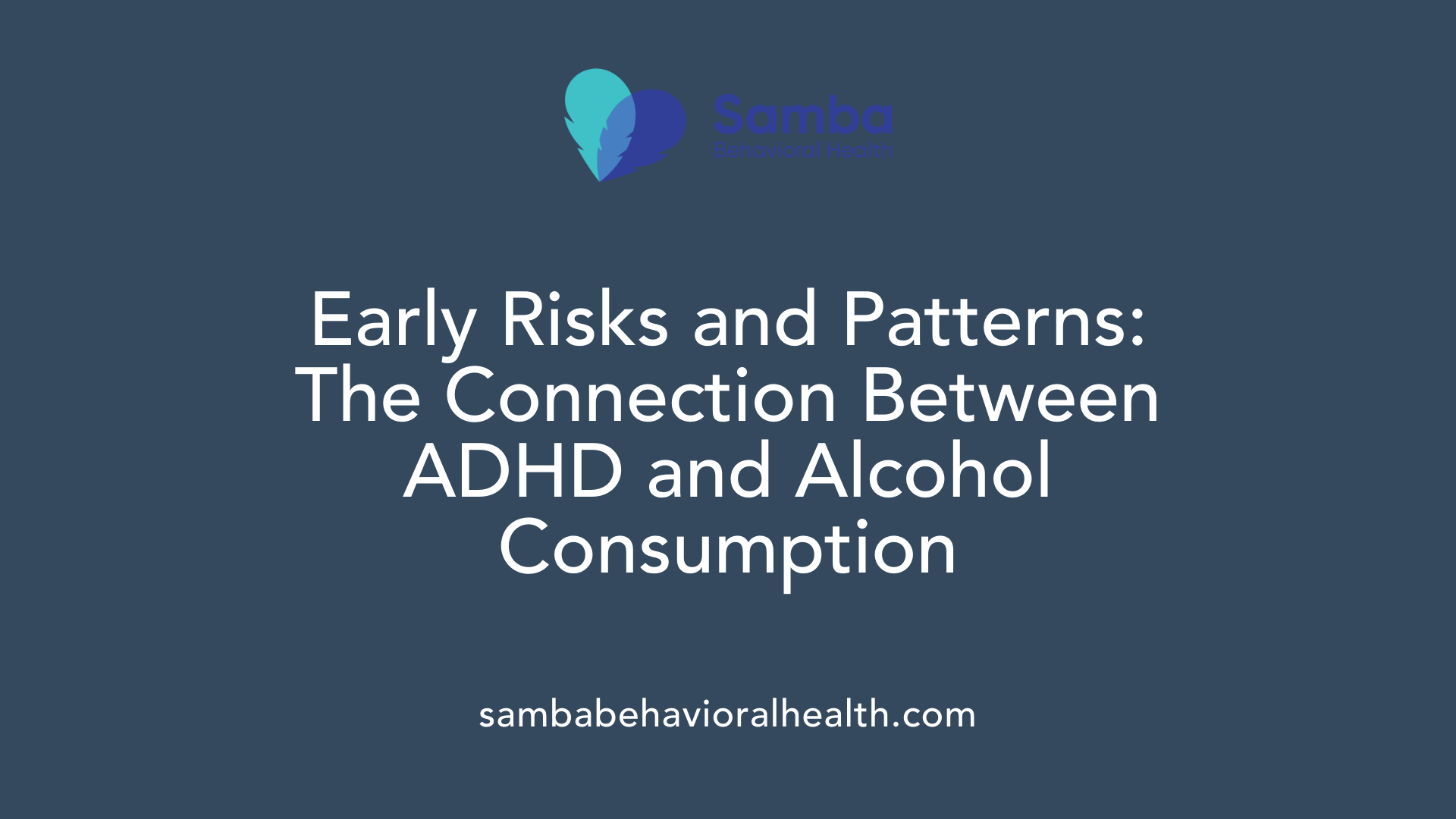
What are risk factors for early alcohol use in individuals with ADHD?
Research consistently shows that children and adolescents diagnosed with ADHD are more inclined to start drinking alcohol at a younger age compared to their peers without ADHD. Factors contributing to this include the impulsivity, sensation-seeking behaviors, and reward sensitivity associated with ADHD. For instance, a twin study from 2018 found that more severe childhood ADHD symptoms correlated significantly with earlier initiation of alcohol use and heavier drinking patterns. These early drinking behaviors are further fueled by the tendency of individuals with ADHD to seek pleasurable sensations, which increases their propensity for binge drinking in early adulthood.
Impulsivity and difficulty with emotional regulation also make adolescents with ADHD more susceptible to risky drinking behaviors. Moreover, combined with environmental influences such as peer pressure and family dynamics, these intrinsic risk factors substantially heighten the likelihood of early alcohol experimentation and misuse.
What is the prevalence of alcohol use disorder among people with ADHD?
Longitudinal studies and clinical data reveal that individuals with ADHD have a markedly increased risk of developing alcohol use disorder (AUD). Estimates indicate that approximately 43% of people with ADHD may develop AUD during their lifetime, which is significantly higher than the general population. In adult populations seeking treatment for substance abuse, about 25% are diagnosed with ADHD. Furthermore, among adult alcoholics, the prevalence of ADHD can be five to ten times higher than in those without the disorder.
Children with ADHD are also more prone to progress from early alcohol use to dependency. Studies show that about 2 in 5 children diagnosed with ADHD will encounter alcohol-related problems later in life. This heightened vulnerability is attributed to shared genetic factors, neurochemical dysregulation—particularly involving dopamine—and behavioral tendencies such as impulsivity and sensation-seeking.
What is the potential causal relationship between ADHD and alcohol misuse?
The link between ADHD and alcohol misuse is complex and appears to support a causal relationship. The neurobiological effects of ADHD, such as dopamine dysregulation, underlie reward-seeking behaviors that can predispose individuals to substance use, including alcohol. Since ADHD generally precedes alcohol use, early symptoms—like heightened impulsivity and difficulty with impulse control—may serve as precursors that increase the likelihood of experimentation and subsequent dependence.
This progression underscores the possibility that ADHD-specific traits create a trajectory toward alcohol misuse, especially if neurochemical imbalances remain unaddressed. Additionally, individuals sometimes resort to alcohol as a form of self-medication to manage hyperactivity, restlessness, or emotional dysregulation, further establishing a potential causal pathway.
Understanding the relationship between ADHD and alcohol use is crucial for developing preventive strategies and early interventions that address these intertwined factors.
| Aspect | Details | Additional Notes |
|---|---|---|
| Risk factors for early alcohol use | Impulsivity, sensation-seeking, reward sensitivity | Twin studies, early onset linked to severity |
| Prevalence of AUD | Up to 43% risk in ADHD populations | Higher than general population, 25% among adults in treatment |
| Causal relationship | ADHD symptoms precede alcohol use; neurochemical dysregulation | Self-medication and reward-seeking behaviors play roles |
Treatment options for co-occurring ADHD and alcohol use
Effective management of individuals with both ADHD and alcohol use disorder involves a comprehensive, personalized approach. Therapeutic interventions such as cognitive-behavioral therapy (CBT) and group therapy are central to addressing harmful drinking behaviors alongside ADHD symptoms.
Medication management is also crucial. While stimulant medications can effectively treat ADHD, they must be carefully used when alcohol dependence is present. Support from specialized inpatient or outpatient programs facilitates comprehensive care, ensuring both conditions are addressed simultaneously.
Newer strategies include the use of long-acting medications with lower abuse potential, shorter prescription durations, and coordinated care platforms that bridge mental health services and addiction treatment.
Conclusion: Tailored, integrated treatment plans significantly enhance outcomes and reduce the risk of relapse for individuals with co-occurring conditions.
Neurobiological Underpinnings of ADHD and Alcohol Interaction
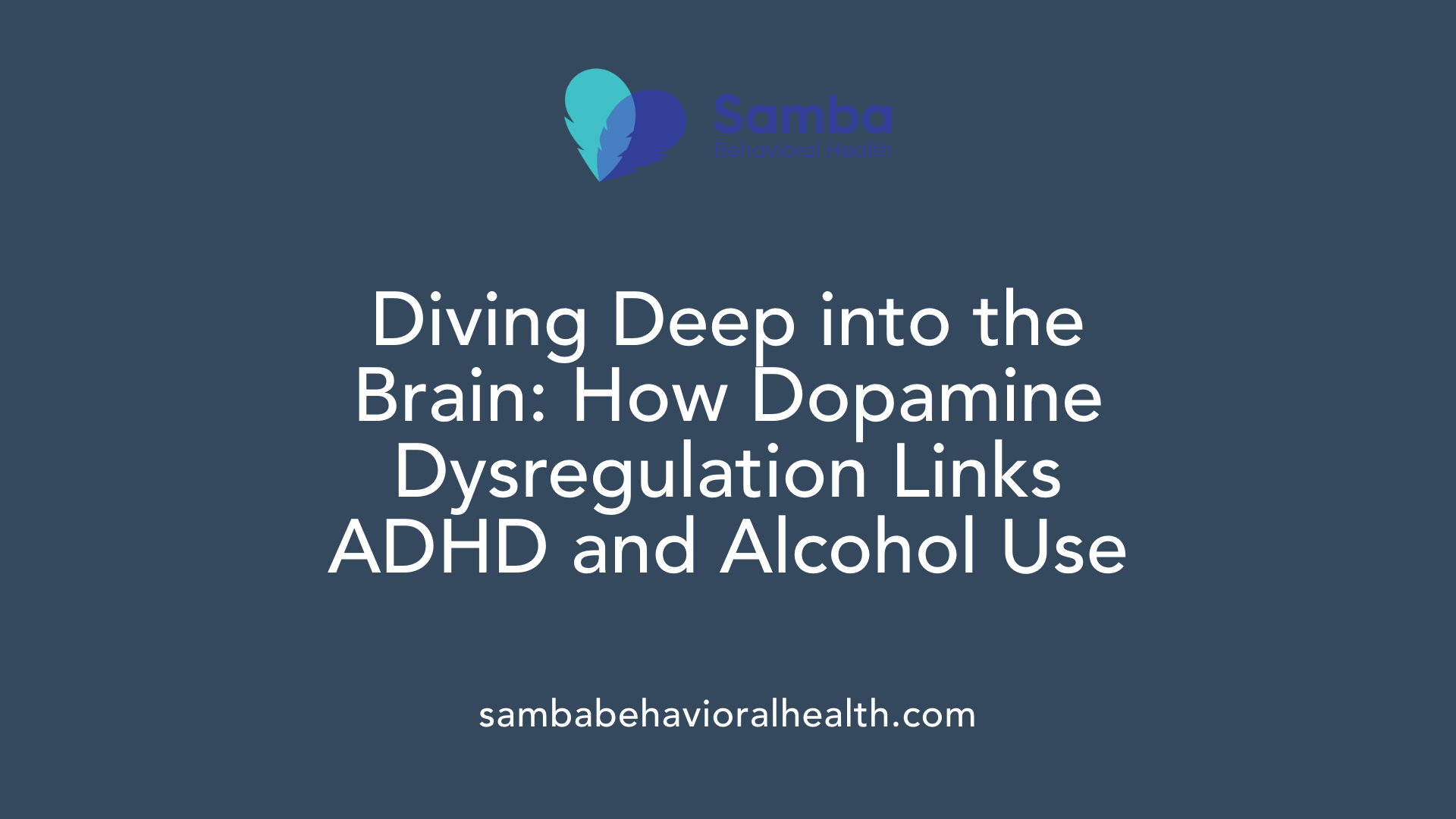
What is the role of dopamine dysregulation in ADHD and alcohol-seeking behavior?
ADHD is characterized by abnormal dopamine transmission in the brain, particularly involving lower concentrations of dopamine transporters. This neurochemical imbalance creates a brain environment that searches for dopamine to achieve normal levels of reward and pleasure. Alcohol consumption temporarily increases dopamine levels, providing a fleeting sense of relief or euphoria, which can reinforce drinking behaviors among individuals with ADHD. This addiction-like cycle is fueled by the brain's craving for dopamine surges, making alcohol an attractive coping mechanism. Over time, reliance on alcohol to boost dopamine can lead to dependence, as the brain becomes accustomed to these artificially elevated dopamine levels.
How does alcohol affect neurotransmitter systems involved in ADHD?
Alcohol impacts several neurotransmitter systems that are already affected in ADHD, including dopamine and noradrenaline. Initially, alcohol intake increases dopamine release, which may temporarily alleviate feelings of hyperactivity or restlessness. However, excessive alcohol consumption disrupts the delicate balance of these neurotransmitters, impairing cognitive functions such as decision-making, problem-solving, and impulse control. It also affects GABA and glutamate systems, which regulate anxiety and excitability. These alterations exacerbate ADHD symptoms over time, leading to worsened inattention, impulsivity, and emotional dysregulation. Consequently, alcohol use can hinder the effectiveness of ADHD medications and interfere with brain recovery.
Which brain regions are affected by ADHD and alcohol, such as the prefrontal cortex?
Both ADHD and alcohol heavily impact the prefrontal cortex, a brain area responsible for executive functions like planning, decision-making, impulse control, and working memory. In ADHD, this region often shows delayed development and reduced activity, contributing to core symptoms like inattention and impulsiveness. Alcohol impairs the prefrontal cortex by disrupting neural connections and reducing its activity, which further impairs judgment and self-control. This dual impact can create a cycle where the brain’s ability to regulate emotions and behavior diminishes, increasing the vulnerability to substance dependence, risky behaviors, and difficulties in managing ADHD symptoms.
| Brain Region | Impact of ADHD | Impact of Alcohol | Combined Effect |
|---|---|---|---|
| Prefrontal Cortex | Reduced activity, delayed development | Impairment of neural connections, decreased activity | Exacerbates impulsivity and inattention |
| Limbic System | Dysregulated emotional responses | Increased emotional reactivity | Heightened mood swings and emotional dysregulation |
| Nucleus Accumbens | Altered reward processing | Increased dopamine release | Reinforces substance-seeking behavior |
Understanding how these brain regions are affected helps in developing targeted treatments and strategic interventions that address both ADHD symptoms and alcohol-related risks.
Effects of Alcohol on ADHD Medication and Health Risks
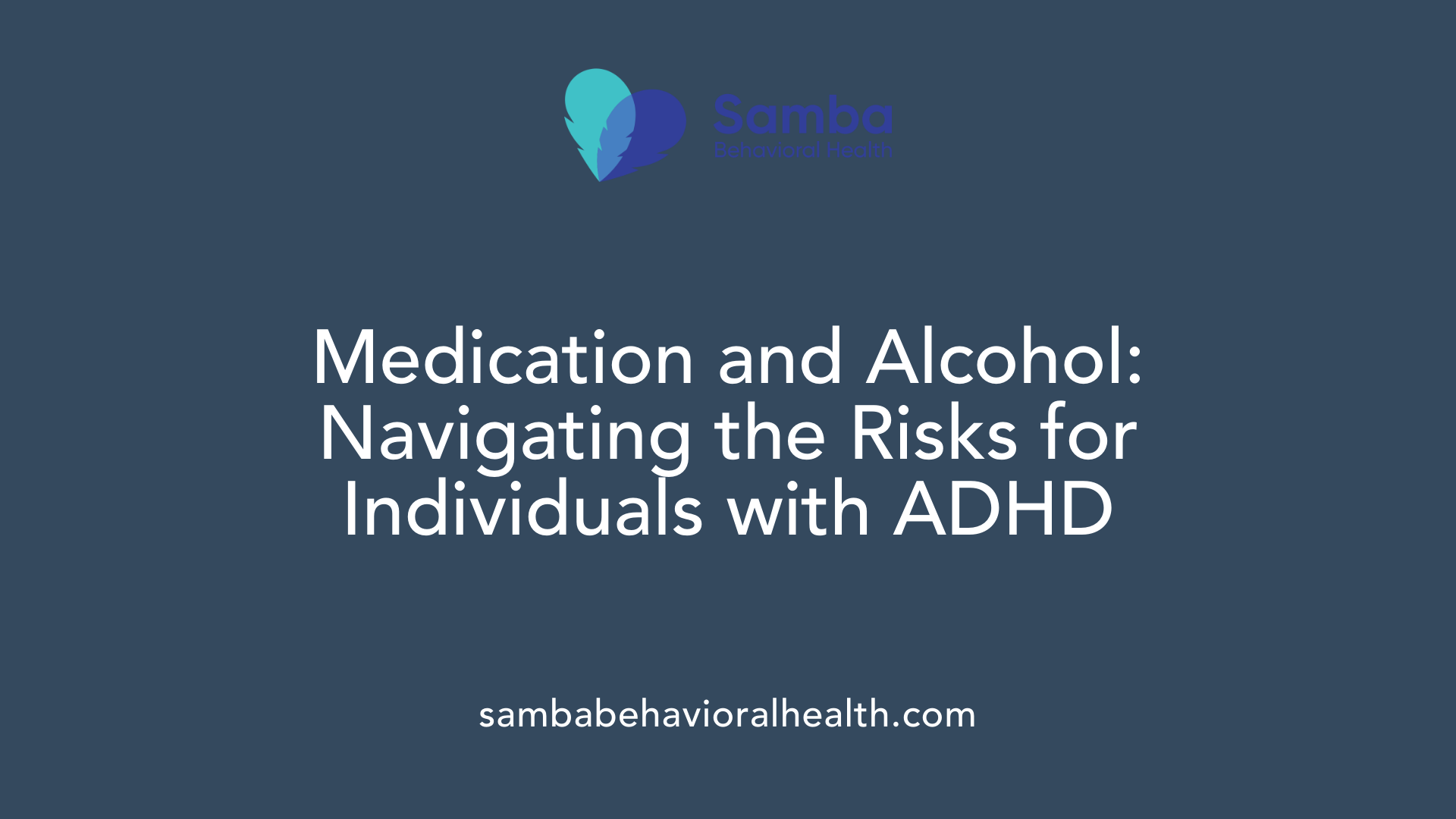
What are the interactions between alcohol and stimulant or non-stimulant ADHD medications?
People with ADHD often take stimulant medications such as Ritalin or Adderall, or non-stimulant options like atomoxetine, to help manage their symptoms. Combining these medications with alcohol can be risky because alcohol can impair their effectiveness and increase side effects.
Stimulant medications increase dopamine and noradrenaline levels, improving attention and impulse control. When mixed with alcohol, which also affects dopamine pathways, there can be unpredictable interactions, leading to increased heart rate, high blood pressure, and anxiety. Additionally, alcohol may diminish the medication’s ability to control ADHD symptoms effectively.
For some non-stimulant medications, the risks include enhanced drowsiness, dizziness, and liver strain. Healthcare providers often advise careful monitoring or avoiding alcohol altogether when on ADHD medications, especially stimulants.
What are the side effects and health risks from mixing alcohol with ADHD drugs?
Mixing alcohol with ADHD medications can cause serious health concerns. Side effects may include heightened drowsiness, dizziness, dehydration, and mood swings. In some cases, it can also lead to severe complications such as overdose, cardiac issues, or liver damage.
The combination can impair judgment and coordination, increasing the risk of accidents and injuries. For individuals on stimulant medications, alcohol can elevate the risk of cardiac problems like increased heart rate or blood pressure. Meanwhile, alcohol's depressant effect combined with ADHD medication's stimulant properties can strain the heart and nervous system.
In some cases, this interaction might mask symptoms of intoxication, leading to excessive consumption and increased danger of overdose.
How does alcohol impact liver, heart, and neurological health?
Long-term alcohol use poses significant health risks, particularly affecting the liver, heart, and brain. Excessive drinking can cause liver diseases such as fatty liver, hepatitis, cirrhosis, and liver cancer.
The heart is also vulnerable; chronic alcohol intake can lead to cardiomyopathy, arrhythmias, and increased risk of stroke. It raises blood pressure and can contribute to cardiovascular disease.
Neurologically, prolonged alcohol use impairs brain functions, leading to memory problems, cognitive decline, and neurological disorders. It can kill neurons, reduce brain volume, and worsen mental health issues like depression and anxiety.
For individuals with ADHD, these health risks add an extra layer of complication, as impaired brain function and health deterioration can aggravate their existing condition and hinder effective management.
Strategies for managing lifestyle with ADHD and minimizing alcohol-related risks
Managing a healthy lifestyle with ADHD involves creating routines, utilizing organizational tools, and seeking support. Establishing consistent daily schedules reduces unpredictability, helping to manage impulsivity and distractibility.
Using digital calendars, reminders, and to-do lists can keep track of appointments and responsibilities, making daily management easier. Incorporating regular physical activity and mindfulness practices has been shown to improve attention and emotional regulation.
Breaking tasks into smaller steps prevents overwhelm and promotes a sense of achievement. Support from therapists or support groups provides guidance tailored to personal needs, fostering better coping strategies.
Furthermore, education about the effects of alcohol and careful medication management can reduce the risk of adverse interactions. Setting clear limits and avoiding triggers associated with drinking is vital.
By adopting these strategies, individuals with ADHD can enhance their quality of life and reduce health risks associated with alcohol use.
How does alcohol consumption affect individuals with ADHD?
Alcohol can greatly impair the cognitive and behavioral functions of individuals with ADHD. It tends to worsen core symptoms such as impulsivity, inattention, and restlessness.
For teenagers and young adults with ADHD, alcohol use often leads to increased chances of binge drinking and risky behaviors. It also interferes with the effectiveness of ADHD medications, making it harder to control symptoms.
Early alcohol use is linked to a higher likelihood of developing alcohol use disorder later in life. Since the adolescent brain is still developing, alcohol can cause lasting damage, worsening mental health and cognitive abilities.
People with ADHD may resort to alcohol as a form of self-medication, seeking relief from their symptoms like hyperactivity and emotional dysregulation. However, this short-term relief is often followed by increased symptoms and dependency risks.
Overall, alcohol use presents additional challenges for managing ADHD effectively, increasing the likelihood of health, behavioral, and social problems.
Does quitting alcohol improve ADHD?
Abstaining from alcohol can lead to improvements in ADHD symptoms, as alcohol directly affects the frontal lobe of the brain, which is crucial for attention, impulse control, and decision-making.
Many individuals with ADHD use alcohol to self-medicate symptoms such as hyperactivity and distractibility. While this may seem to provide temporary relief, in the long run, it worsens their cognitive functions and increases the risk of developing alcohol use disorder.
Stopping alcohol consumption helps restore normal brain function, especially in regions involved in cognition and emotional regulation. It can improve focus, reduce impulsivity, and enhance overall mental health.
Furthermore, abstinence lowers the risk of alcohol-related health issues like liver disease, cardiovascular problems, and neurological damage. Combined with appropriate ADHD treatment, quitting alcohol greatly improves treatment outcomes.
It is important, however, that individuals seeking to quit seek professional support, as managing both ADHD and recovery from alcohol dependence requires comprehensive care.
Are there treatment options for people with co-occurring ADHD and alcohol use?
Yes, treatment options are available and often most effective when tailored to address both conditions concurrently. Integrated approaches include behavioral therapies like cognitive-behavioral therapy (CBT), which helps modify harmful behaviors and develop coping skills.
Medication management may involve carefully prescribed stimulants or non-stimulant medications to manage ADHD symptoms, with close monitoring for interactions with alcohol. Medications to reduce cravings and prevent relapse, such as naltrexone or acamprosate, can also be part of the treatment plan.
Support groups and inpatient or outpatient rehabilitation programs provide social support and structured environments for recovery. These programs often coordinate mental health and addiction care to improve outcomes.
Combining therapy, medication, and support systems helps address the complex relationship between ADHD and alcohol use, offering better chances for sustained recovery. Healthcare professionals specializing in dual diagnoses are best suited to guide treatment plans tailored for individual needs.
Long-term Health Risks and Emotional Impact
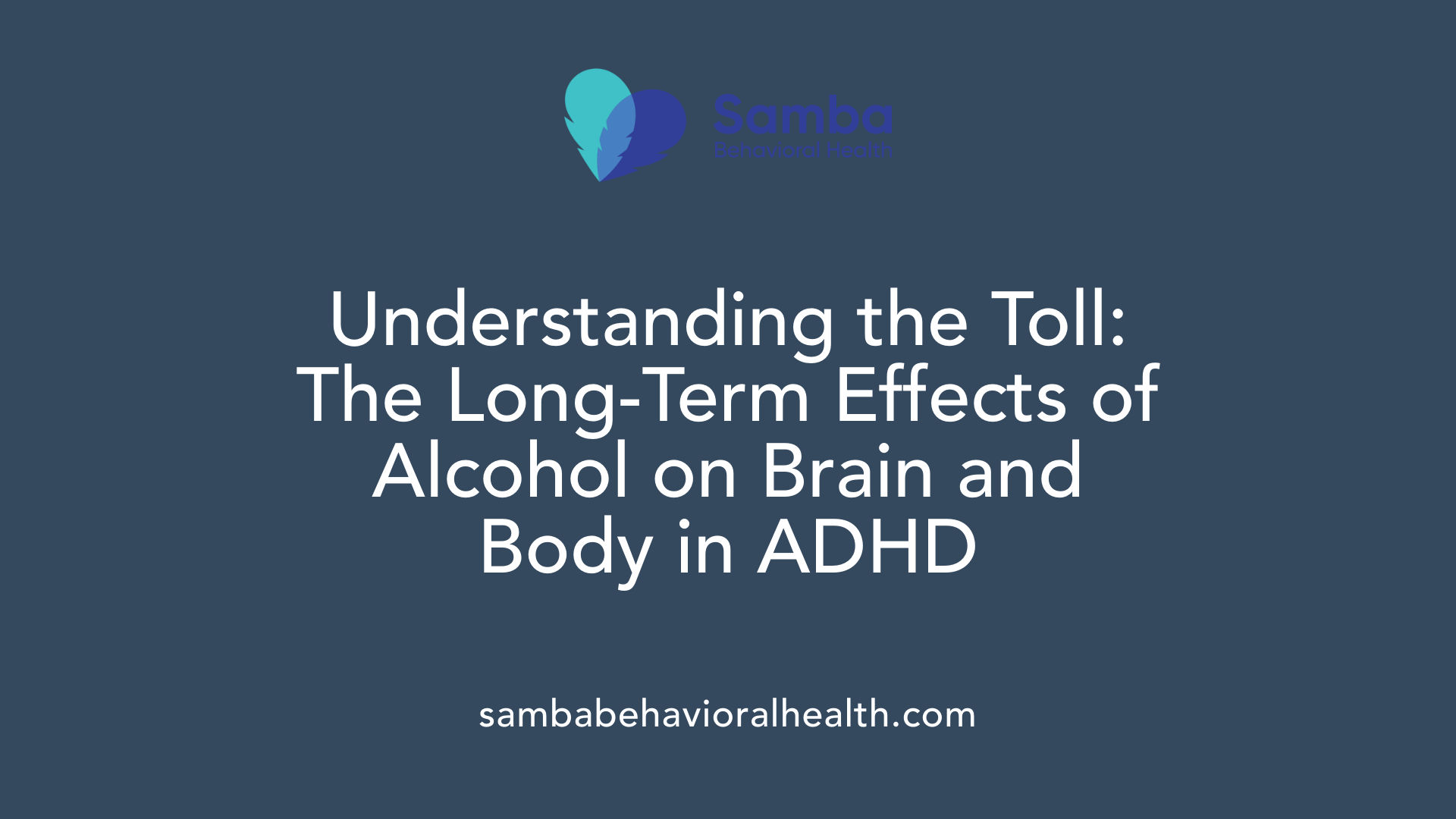
What are the health risks from prolonged alcohol use, including effects on liver, heart, and neurological health?
Long-term alcohol consumption poses serious health threats across multiple organ systems. The liver is especially vulnerable, with chronic use leading to conditions like fatty liver, alcoholic hepatitis, cirrhosis, and an increased risk of liver cancer. The heart can also suffer; persistent alcohol intake can cause hypertension, cardiomyopathy, arrhythmias, and increase the risk of stroke. Neurological consequences are profound, ranging from cognitive decline and peripheral neuropathy to neurological disorders like Wernicke-Korsakoff syndrome, which impairs memory and coordination.
Moreover, heavy alcohol use elevates the risk of various cancers, including those of the mouth, throat, oesophagus, liver, and breast. It can also compromise immune function, making individuals more susceptible to infections and slowing recovery from illnesses. The combination of these health issues can diminish quality of life, cause disability, and increase mortality rates.
| Organ System | Common Conditions from Alcohol Abuse | Additional Notes |
|---|---|---|
| Liver | Fatty liver, hepatitis, cirrhosis | Progressive damage can be irreversible |
| Heart | Hypertension, cardiomyopathy, arrhythmias | Increased risk of cardiovascular disease |
| Neurological | Cognitive decline, brain damage, peripheral neuropathy | Can lead to permanent disability |
| Other | Increased cancer risk, immune suppression | Affects overall health and longevity |
How does alcohol impact emotional regulation and mental health in individuals with ADHD?
Alcohol’s influence on mood regulation and mental health can be particularly detrimental for those with ADHD. It can temporarily reduce anxiety and hyperactivity, but over time, alcohol worsens emotional dysregulation, a core issue in ADHD. The depressant effects on neurotransmitter systems, especially dopamine and norepinephrine, impair the brain's ability to regulate emotions effectively. This results in increased mood swings, irritability, and anxiety.
People with ADHD often turn to alcohol to self-medicate symptoms like restlessness, impulsivity, and emotional instability. While alcohol might offer momentary relief, it often leads to a cycle of guilt, depression, and heightened impulsivity. Chronic alcohol use can further impair the prefrontal cortex, the area responsible for decision-making and impulse control, worsening ADHD symptoms. This creates a difficult loop of dependence and emotional distress.
Additionally, alcohol interactions with ADHD medications can diminish treatment efficacy, leading to poorer overall mental health outcomes. Managing these emotional challenges requires a comprehensive approach, including therapy, medication, and lifestyle adjustments aimed at improving emotional regulation.
| Aspect | Impact of Alcohol | Consequences for ADHD |
|---|---|---|
| Emotional Regulation | Worsens mood swings, increases irritability | Heightened impulsivity, emotional instability |
| Mental Health | Elevates risk of depression, anxiety, emotional distress | Reduced effectiveness of ADHD treatment |
| Self-Medication Risks | Provides temporary relief but leads to dependency | Cycle of guilt, worsening symptoms |
What strategies help manage lifestyle with ADHD?
Effective management starts with establishing routines that provide predictability and structure, which help reduce stress and improve focus. Utilizing organizational tools such as digital calendars, reminders, and checklists can facilitate task management and prevent overwhelm.
Incorporating regular physical activity is crucial, as it boosts dopamine levels and improves attention. Mindfulness practices, including meditation and breathing exercises, can help enhance emotional control and reduce impulsivity.
Breaking larger tasks into smaller steps makes them more manageable and provides a sense of accomplishment, motivating ongoing progress. Seeking support from therapists or support groups offers guidance, encouragement, and accountability.
Creating a balanced lifestyle with healthy sleep habits, nutritious food, and scheduled downtime enhances overall wellbeing. These strategies collectively contribute to better symptom management and a healthier lifestyle framework.
| Strategy | Purpose | Additional Tips |
|---|---|---|
| Routine Establishment | Reduce unpredictability | Set specific wake-up, meal, and sleep times |
| Organizational Tools | Manage tasks effectively | Use digital apps for reminders and checklists |
| Physical Activity | Boost dopamine, improve focus | Engage in daily exercise like walking or sports |
| Mindfulness | Enhance emotional regulation | Practice meditation or breathing exercises |
| Support Systems | Gain guidance and motivation | Join therapy sessions or peer support groups |
Does alcohol make ADHD worse?
Yes, alcohol generally exacerbates ADHD symptoms. It impairs functions controlled by the prefrontal cortex, including focus, problem-solving, and impulse control. Teenagers and young adults with ADHD are particularly vulnerable.
Alcohol increases impulsivity and risk-taking behaviors, making individuals more prone to risky activities, including binge drinking. It interferes with the effectiveness of medications used to treat ADHD, sometimes diminishing their beneficial effects and leading to increased health risks like high blood pressure and cardiac issues.
Chronic use can lead to the development of alcohol use disorder, further impairing cognitive functions and emotional stability. The cycle of using alcohol to self-medicate hyperactivity or anxiety ultimately worsens these conditions, making management of ADHD more difficult.
Can quitting alcohol improve ADHD?
Abstaining from alcohol can significantly improve ADHD symptoms, especially because alcohol damages brain regions involved in attention and impulse control, such as the prefrontal cortex. Many individuals with ADHD use alcohol to self-medicate, but this usually worsens their symptoms over time.
Stopping alcohol reduces the risk of developing alcohol use disorder, enhances medication effectiveness, and improves overall mental health. It allows the brain to recover and regain better regulation of mood and cognition.
While quitting alcohol alone can lead to improvements, comprehensive treatment—combining medication, therapy, and lifestyle changes—provides the best chance for managing ADHD symptoms effectively.
Are there effective treatments for those with both ADHD and alcohol use disorder?
Yes, integrated treatment strategies are essential for managing co-occurring ADHD and alcohol use disorder. Behavioral therapies like cognitive-behavioral therapy (CBT) are effective in addressing both conditions concurrently.
Medication management involves carefully prescribed stimulant or non-stimulant medications. When used under medical supervision, these can alleviate ADHD symptoms while considering the risks associated with alcohol use.
Support groups and inpatient or outpatient programs tailored for dual diagnosis improve treatment adherence and address underlying issues. Holistic approaches, including family therapy, psychoeducation, and lifestyle modifications, enhance recovery.
Successful management requires coordinated care by healthcare professionals experienced with complex cases, focusing on safe medication use, behavioral support, and relapse prevention.
Emotional Dysregulation and Quality of Life in ADHD and Alcohol Use
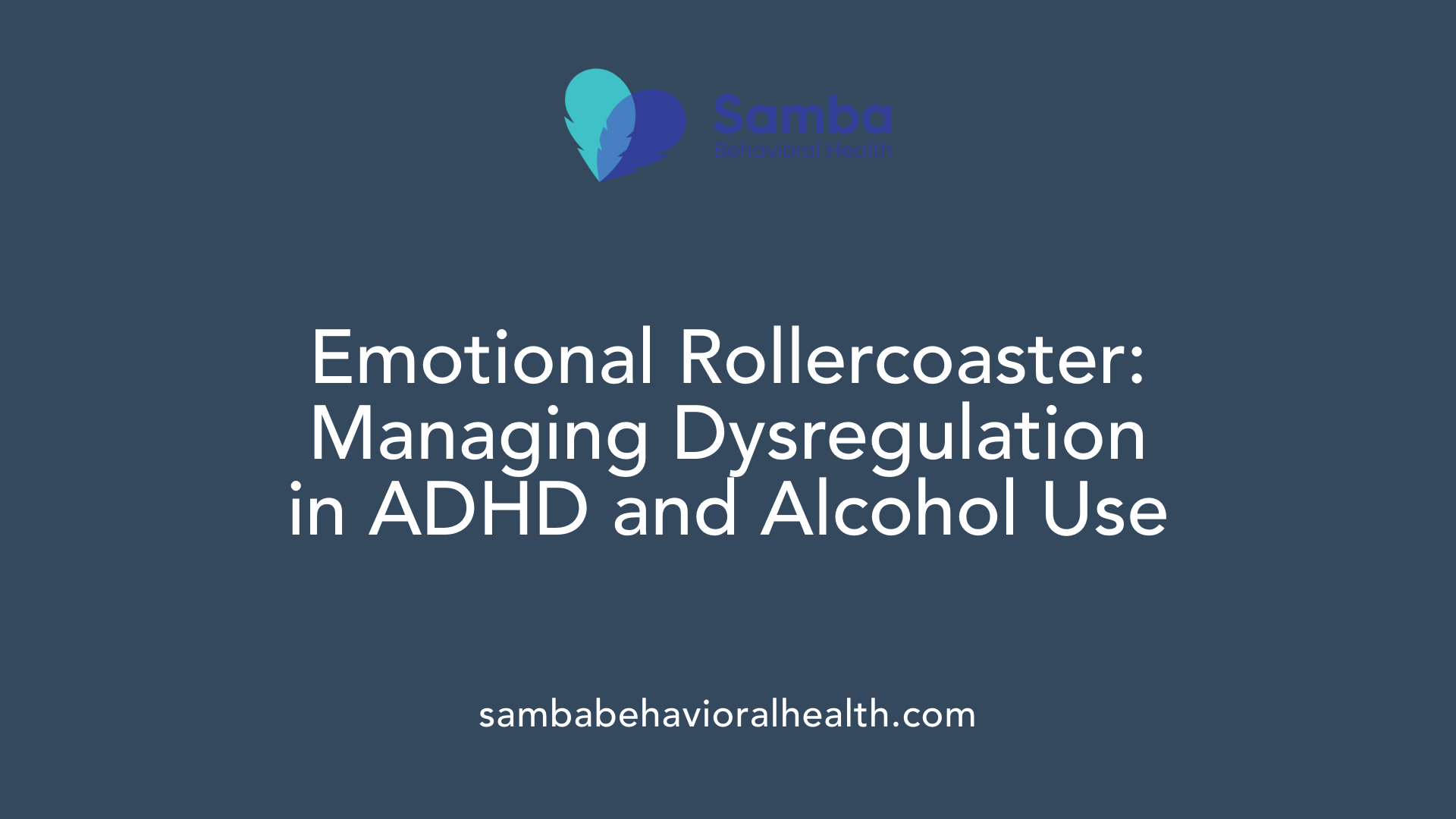
What are effective strategies for managing lifestyle with ADHD?
Managing life with ADHD involves adopting several practical strategies to mitigate symptoms and improve daily functioning. Consistency is crucial; establishing regular routines helps reduce unpredictability and enhances focus. Using organizational tools such as digital calendars, reminders, and to-do lists assists in handling daily tasks and deadlines effectively.
Physical activity and mindfulness practices are also beneficial. Exercise helps improve attention and decreases impulsivity, while mindfulness can promote emotional regulation and reduce stress. Breaking large tasks into smaller steps can prevent overwhelm and contribute to a sense of achievement. Seeking support from therapists or support groups provides guidance and encouragement, helping develop personalized coping mechanisms.
Embracing these strategies can foster a more balanced lifestyle, reducing the risk of impulsive decisions, including problematic alcohol use, and supporting overall mental health.
Conclusion: Navigating a Path to Better Mental Health
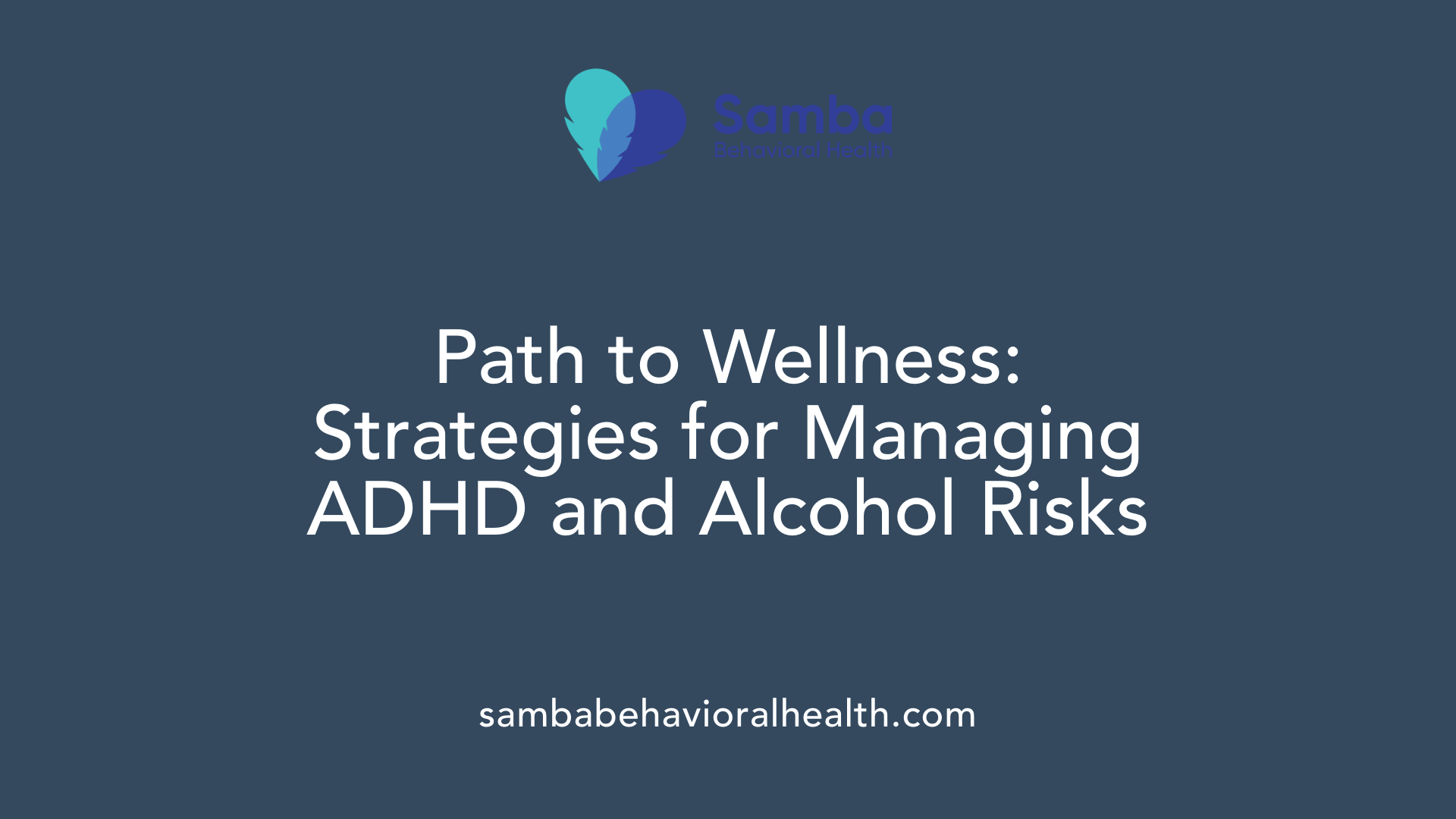
Why is there a link between ADHD and alcohol use disorder?
Research firmly supports a connection between ADHD and an increased risk of developing substance use disorders, including alcohol abuse. Children diagnosed with ADHD show a tendency to start drinking early and are more likely to engage in binge drinking behaviors during adolescence and early adulthood. Studies indicate that approximately 43% of individuals with ADHD may develop alcohol use disorder (AUD), highlighting how common this comorbidity is.
ADHD often predates alcohol use, suggesting a potential causal relationship. Traits like impulsivity and reward-seeking behavior associated with ADHD make individuals more prone to alcohol experimentation. Many young people with ADHD turn to alcohol to self-medicate hyperactivity or stress, unintentionally worsening their symptoms.
How does alcohol impact individuals with ADHD?
Alcohol consumption can severely impair the functioning of the prefrontal cortex, a brain region critical for attention, impulse control, and decision-making—areas already affected in ADHD. For individuals with ADHD, alcohol can increase symptoms such as inattention, impulsivity, and restlessness, complicating daily functioning.
Teenagers and young adults with ADHD are more susceptible to binge drinking, which is linked to risky behaviors, emotional distress, and a higher likelihood of developing long-term alcohol problems. Moreover, alcohol interferes with ADHD medications like stimulants, reducing their effectiveness and potentially causing side effects like increased heart rate and elevated blood pressure.
Long-term alcohol use can cause cognitive decline, memory issues, and neurological damage, which can further exacerbate ADHD symptoms, creating a challenging cycle.
Are individuals with ADHD more sensitive to alcohol?
Yes, people with ADHD often experience alcohol’s effects more intensely, even at similar or lesser amounts compared to individuals without ADHD. This heightened sensitivity can increase their risk for accidents, impaired judgment, and risky behaviors.
Furthermore, alcohol may temporarily relieve some ADHD symptoms like hyperactivity or racing thoughts. However, this relief is short-lived, and subsequent effects typically worsen symptoms, leading to a cycle of dependence and worsening mental health.
What are the health risks from prolonged alcohol use?
Persistent alcohol consumption raises serious health concerns, including liver disease, cardiovascular problems, neurological issues, and increased cancer risk. When combined with ADHD, the risk of accidents, injuries, and legal issues also rises. Chronic alcohol use can impair cognition, decision-making, and speech, especially in those with underlying ADHD, whose executive functions are already compromised.
How are co-occurring ADHD and alcohol use disorder treated?
Treatments that address both conditions simultaneously tend to be most effective. These include behavioral therapies like cognitive-behavioral therapy (CBT), which helps modify harmful behaviors and develop healthier coping skills.
Medication management is also crucial but must be tailored carefully. ADHD medications, such as stimulants and non-stimulants, can generally be used safely if closely monitored, especially when combined with alcohol treatment programs.
Support groups and inpatient or outpatient programs provide additional support, encouraging sustained recovery and helping individuals manage their symptoms better.
Why is early diagnosis and integrated care important?
Early detection of ADHD allows for timely intervention, reducing the likelihood of early alcohol use and dependence. Integrated treatment approaches that concurrently address ADHD and substance abuse improve outcomes, reduce relapse, and promote healthier lifestyles.
Personalized care, which considers each individual’s needs, medication responses, and environmental factors, is essential. Ongoing support from healthcare providers, family, and peer groups fosters resilience and healthier coping mechanisms.
What effective strategies help manage lifestyle with ADHD?
Managing ADHD involves establishing consistent daily routines to minimize unpredictability. Using organizational tools such as digital calendars, reminders, and checklists helps keep track of tasks and deadlines.
Regular physical activity and mindfulness practices improve attention and impulsivity control. Breaking tasks into smaller steps prevents overwhelm and builds confidence. Support from therapists or support groups provides guidance tailored to personal challenges.
Final thoughts on managing ADHD and alcohol risks
Understanding the intertwined nature of ADHD and alcohol use calls for comprehensive strategies focusing on prevention, early intervention, and individualized treatment. Avoiding harmful alcohol use and managing ADHD symptoms effectively can significantly reduce health risks and improve overall well-being.
Professionals emphasize the importance of coordinated care, which integrates behavioral therapy, medication management, support networks, and lifestyle modifications. This approach enhances recovery prospects and promotes a healthier, more balanced life for those affected by these co-occurring conditions.
A Holistic Approach to Managing ADHD and Alcohol Risks
Addressing the intertwined challenges of ADHD and alcohol misuse requires early diagnosis, personalized treatment strategies, and ongoing support. Integrated approaches that combine behavioral therapy, medication management, lifestyle modifications, and support networks can significantly improve outcomes. Educating individuals about the risks, managing impulsivity, and fostering healthier coping mechanisms are essential steps toward enhancing quality of life. Ultimately, understanding the biological, psychological, and social facets of ADHD and alcohol use paves the way for effective intervention and healthier, more fulfilling lives.
References
- Alcohol and ADHD: How They're Linked | Gateway Foundation
- The Clinically Meaningful Link Between Alcohol Use and Attention ...
- ADHD and alcohol: Emotional regulation efforts pay off in quality of ...
- How Alcohol Affects Those with ADHD - Healthline
- How Alcohol Abuse Affects ADHD
- When you mix alcohol and ADHD | Alcohol Change UK
- ADHD and Alcohol: The Risks of Drinking With This Disorder
- Treating ADHD in Patients With Alcohol Use Disorder
- Adult symptoms of ASD and ADHD in relation to alcohol use
